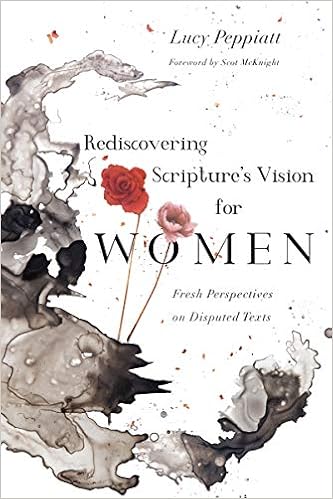
This Week on Seminary Dropout…
Lucy Peppiatt (PhD, Otago) is the principal of Westminster Theological Centre. Her research interests are Christ and the Spirit, charismatic theology, discipleship, and 1 Corinthians, and her books include Unveiling Paul’s Women and Women and Worship in Corinth.
Rediscovering Scripture’s Vision for Women: Fresh Perspectives on Disputed Texts
Does God call women to serve as equal partners in marriage and as leaders in the church?The answer to this straightforward question is deeply contested. Into the fray, Lucy Peppiatt offers her work on interpretation of the Bible and Christian practice. With careful exegetical work, Peppiatt considers relevant passages in Ephesians, Colossians, 1 Peter, 1 Timothy, and 1 Corinthians. There she finds a story of God releasing women alongside men into all forms of ministry, leadership, work, and service on the basis of character and gifting, rather than biological sex. Those who see the overturning of male-dominated hierarchy in the Scriptures, she argues, are truly rediscovering an ancient message―a message distorted by those who assumed that a patriarchal world, which they sometimes saw reflected in the Bible, was the one God had ordained.
-From the Publisher
Unveiling Paul’s Women: Making Sense of 1 Corinthians 11:2–16
Whether people realize it or not, the ideas in 1 Corinthians 11:2-16 have had a huge impact on the role of Christian women in the church through the centuries. These fifteen verses have shaped worship practices, church structures, church leadership, marriages, and even relationships between men and women in general. They have contributed to practices that have consistently placed women in a subordinate role to men, and have been used to justify the idea that a woman should not occupy a leadership or teaching position without being under the authority or “covering” of a man. It is strange, therefore, that academics and pastors alike continue to note how confusing and difficult it continues to be to make sense of these very verses. In this little book, Lucy Peppiatt not only highlights the problems associated with using this text to justify the subordination of women, but offers a clear and plausible re-reading of the text that paints the apostle Paul as a radical, visionary, church planter who championed women in all forms of leadership.
-From the Publisher
Women and Worship at Corinth: Paul’s Rhetorical Arguments in 1 Corinthians
Making sense of Paul’s arguments in 1 Corinthians 11-14 regarding both the role of women in public worship and the value of tongues and prophecy for the unbeliever has long posed challenges for any lay reader or scholar. Despite numerous explanations offered over the years, these passages remain marked by inconsistencies, contradictions, and puzzles. Lucy Peppiatt offers a reading of 1 Corinthians 11-14 in which she proposes that Paul is in conversation with the Corinthian male leadership regarding their domineering, superior, and selfish practices, including coercing the women to wear head coverings, lording it over the “have-nots” at the Lord’s Supper, speaking in tongues all at once, and ordering married women to keep quiet in church. Through careful exegesis and theological comment this reading not only brings internal coherence to the text, but paints a picture of the apostle gripped by a vision for a new humanity “in the Lord” resulting in his refusal to compromise with the traditional views of his own society. Instead, as those who should identify with the crucified Christ, he exhorts the Corinthians to make “love” their aim, and thus to restore dignity and honor to women, the outsider, and the poor.
-From the Publisher




Missio Alliance Comment Policy
The Missio Alliance Writing Collectives exist as a ministry of writing to resource theological practitioners for mission. From our Leading Voices to our regular Writing Team and those invited to publish with us as Community Voices, we are creating a space for thoughtful engagement of critical issues and questions facing the North American Church in God’s mission. This sort of thoughtful engagement is something that we seek to engender not only in our publishing, but in conversations that unfold as a result in the comment section of our articles.
Unfortunately, because of the relational distance introduced by online communication, “thoughtful engagement” and “comment sections” seldom go hand in hand. At the same time, censorship of comments by those who disagree with points made by authors, whose anger or limited perspective taints their words, or who simply feel the need to express their own opinion on a topic without any meaningful engagement with the article or comment in question can mask an important window into the true state of Christian discourse. As such, Missio Alliance sets forth the following suggestions for those who wish to engage in conversation around our writing:
1. Seek to understand the author’s intent.
If you disagree with something the an author said, consider framing your response as, “I hear you as saying _________. Am I understanding you correctly? If so, here’s why I disagree. _____________.
2. Seek to make your own voice heard.
We deeply desire and value the voice and perspective of our readers. However you may react to an article we publish or a fellow commenter, we encourage you to set forth that reaction is the most constructive way possible. Use your voice and perspective to move conversation forward rather than shut it down.
3. Share your story.
One of our favorite tenants is that “an enemy is someone whose story we haven’t heard.” Very often disagreements and rants are the result of people talking past rather than to one another. Everyone’s perspective is intimately bound up with their own stories – their contexts and experiences. We encourage you to couch your comments in whatever aspect of your own story might help others understand where you are coming from.
In view of those suggestions for shaping conversation on our site and in an effort to curate a hospitable space of open conversation, Missio Alliance may delete comments and/or ban users who show no regard for constructive engagement, especially those whose comments are easily construed as trolling, threatening, or abusive.